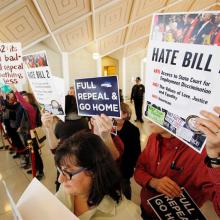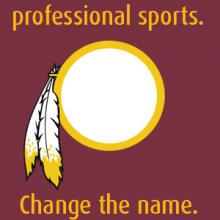NBA
On Sunday, Aug. 23 at Jacob Blake was shot seven times in the back by Kenosha, Wis., police in broad daylight in front of his three sons ages 3, 5, and 8. The bullets damaged Blake’s spinal cord and left him paralyzed. His brutal shooting has not only left his body broken but it has also affected the psyche of his young children — another generation gripped by fear of police.
A deal has fallen apart to undo the North Carolina law known as the “bathroom bill,” in a sign of the state’s bitter political divide.
The state’s legislature was called into a special session on Dec. 21, to consider repealing the law known as HB2 after months of pressure, including lost jobs and canceled sporting events and concerts.
“Redskins.” The name of Washington, D.C.’s football team is a racial slur, a racist epithet. The U.S. trademark office agrees; so does the dictionary. But more importantly, Native American people feel it. How important is that to the rest of us? That is the moral question for all of us: are we going to show respect for our nation’s original citizens?
In an insightful column for the Chicago Tribune, Clarence Page compared NBA Commissioner Adam Silver’s decision to ban Clippers owner Donald Sterling “for life” for his private racist comments, with the decision yet to be made by the NFL and Washington’s owner to change a name deeply perceived as a public racist comment. “That’s the question at the heart in the name dispute. Who gets respect,” says Page.
Think about the name. Say it in your head or out loud in a private space. What comes to mind? Try to imagine why Native Americans feel the way they do.
Long before head coach Doc Rivers found himself defending his Los Angeles Clippers players who were the unwelcome participants in team owner Donald Sterling’s racist comments all week, he was concerned about another sensitive subject: religion.
It was late 1999, the start of Rivers’ first season as coach of the Orlando Magic, and he saw a situation in the locker room that he felt needed to be addressed.
As his players took part in the pregame prayer that was part of their routine, Rivers noticed something he didn’t like.
“I looked up in one of the prayers, and Tariq [Abdul-Wahad] had his arms folded, and you could see that he was really uncomfortable with it,” Rivers said. “So the next game, we were standing up in a circle, and I said, ‘Hey guys, we’re no longer praying.’”
Dear White People,
We need to take a long, painful look in the mirror. The image we see will make us uncomfortable, but, tragically, it is us.
The image staring you back at you is the image of Donald Sterling.
We have found a new sense of self-righteousness by uniting against Sterling for his racist comments. All of us white people can agree that Sterling is a despicable human being and he deserved to be banned from the NBA for life and to be fined.
We are morally outraged. We hate Sterling with a united and perfect hatred.
But make no mistake, we are Donald Sterling.
The ugly racial statements of the Los Angeles Clippers owner Donald Sterling sparked a series of hopefully historic events over the last several days. The press conferences on Tuesday by NBA Commissioner Adam Silver and by Sacramento Mayor Kevin Johnson — a former NBA star and the player’s representative in this crisis—are worthy of deeper reflection.
With both passion and outrage in his face, NBA Commissioner Silver banned Sterling for life from both the L.A. Clippers and the NBA for his racist comments about African-Americans. Sterling’s despicable racial opinions made him the ugly and ignorant face of white racism, a dishonor undoubtedly earned due to a his personal history of hateful racial discrimination.
Donald Sterling, eccentric billionaire and owner – at least for the moment – of the Los Angeles Clippers basketball team, learned firsthand the weight of his own words on Tuesday. After allegedly being recorded making numerous racist remarks about African-Americans (both on his team and otherwise), the National Basketball Association handed him a lifetime suspension from association with his own team, along with a $2.5 million fine.
Though Sterling’s comments were highly inflammatory and distasteful, the NBA’s swift and severe consequences helps contain the damage, keeping the poison from infecting the league’s reputation any more than it already has. And good riddance to such attitudes, as they should find no audience in any public forum, let alone in a sport where a majority of the players are black.
Sterling’s consequence is not why I feel pity for him. He got what he deserved, and the stigma that goes with such shunning likely will weigh on his future business ventures. What saddens me for him is the sense I have of him as an individual, having read extensively about him online, and having listened to the audiotapes attributed to him.






